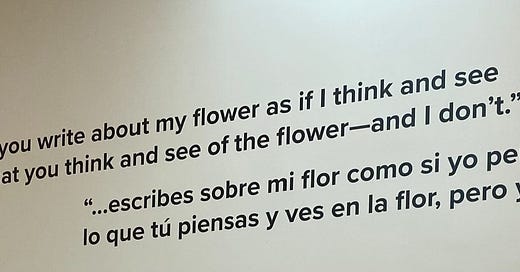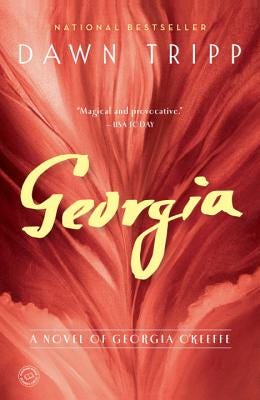When I become interested in a subject, especially when it’s a woman, I turn to historical fiction. I’m not sure why—maybe diving right into nonfiction makes me feel like I’m back in school? At the very least my compromised ability to pay attention means fiction of any kind is the right starting point. Thankfully, I found Dawn Tripp’s novel Georgia—a wonderful introduction to this fascinating woman and her life.
The novel opens when O’Keeffe is 29 and has taken a train from Texas to Manhattan to pursue her career as an artist. There she meets Alfred Stieglitz, the photographer and gallerist, who would go on to be the first to exhibit her art, mentor her, and later become her lover and husband, despite being 20 years her senior. Tripp is skilled in depicting, not just the details of their tumultuous relationship, including his numerous affairs, but also the impact of their years together on O’Keeffe’s life and her art.
What struck me, stuck with me, is how O’Keeffe made her own way. She went to art school, but when told by her male professors the way she painted was wrong, ignored them and continued to paint how she wanted to. For O’Keeffe, everything was about the feelings evoked, whether it was a charcoal landscape of trees in winter or an abstract series of shapes washed with color. Even when her eyesight failed, she had no choice but to create. There was no winding down or loss of motivation, nothing but an instinct to paint as strong within her as the one to breathe. Tripp beautifully conveys this in Georgia in a way that felt expansive and intimate at the same time. I am so happy to have read it.
Georgia was just the next-step reading I needed to learn more about this artist. It was like walking through her museum—stepping from one room to the next provided another insight into her and yet by the last room I had even more questions. What must it be like to know for certain that what you’re doing is exactly what you’re meant to be doing despite others, particularly people in authority, doubting you? And to feel a force within you so deeply that even as your body was fading you were still compelled to create?
What do you think about historical fiction that leaves you with questions?
Do you like learning about new things in your fiction reading?





Historical fiction lets you step into the shoes of people from the past in a way nonfiction often can't—it immerses you in their world, emotions, and daily lives.